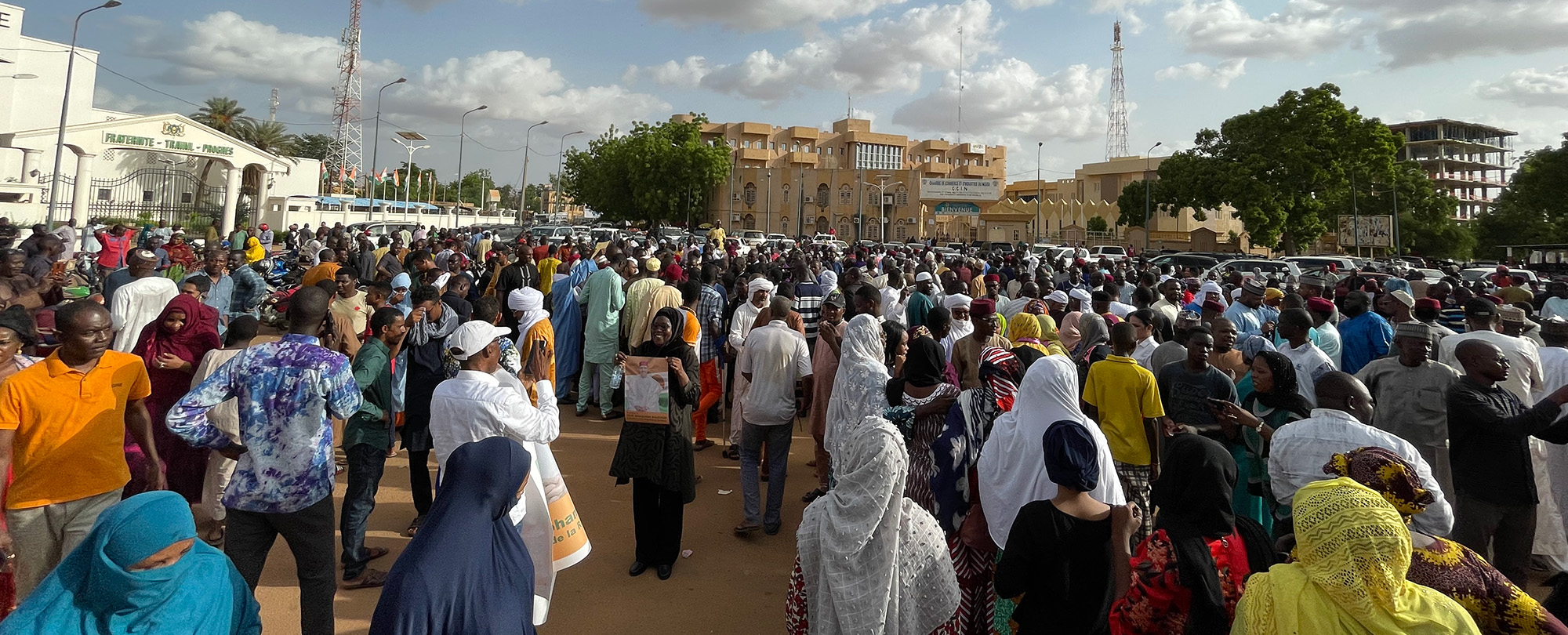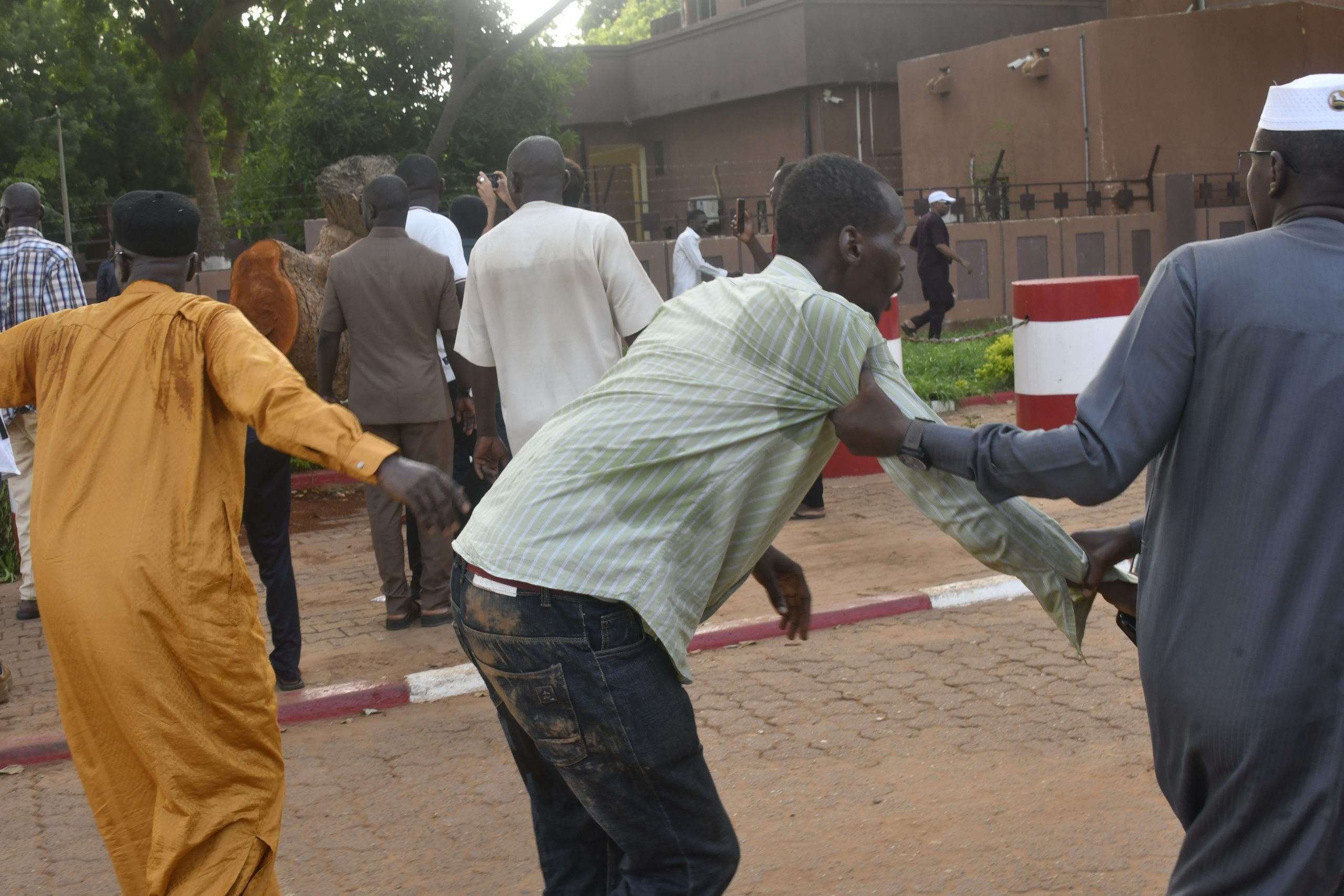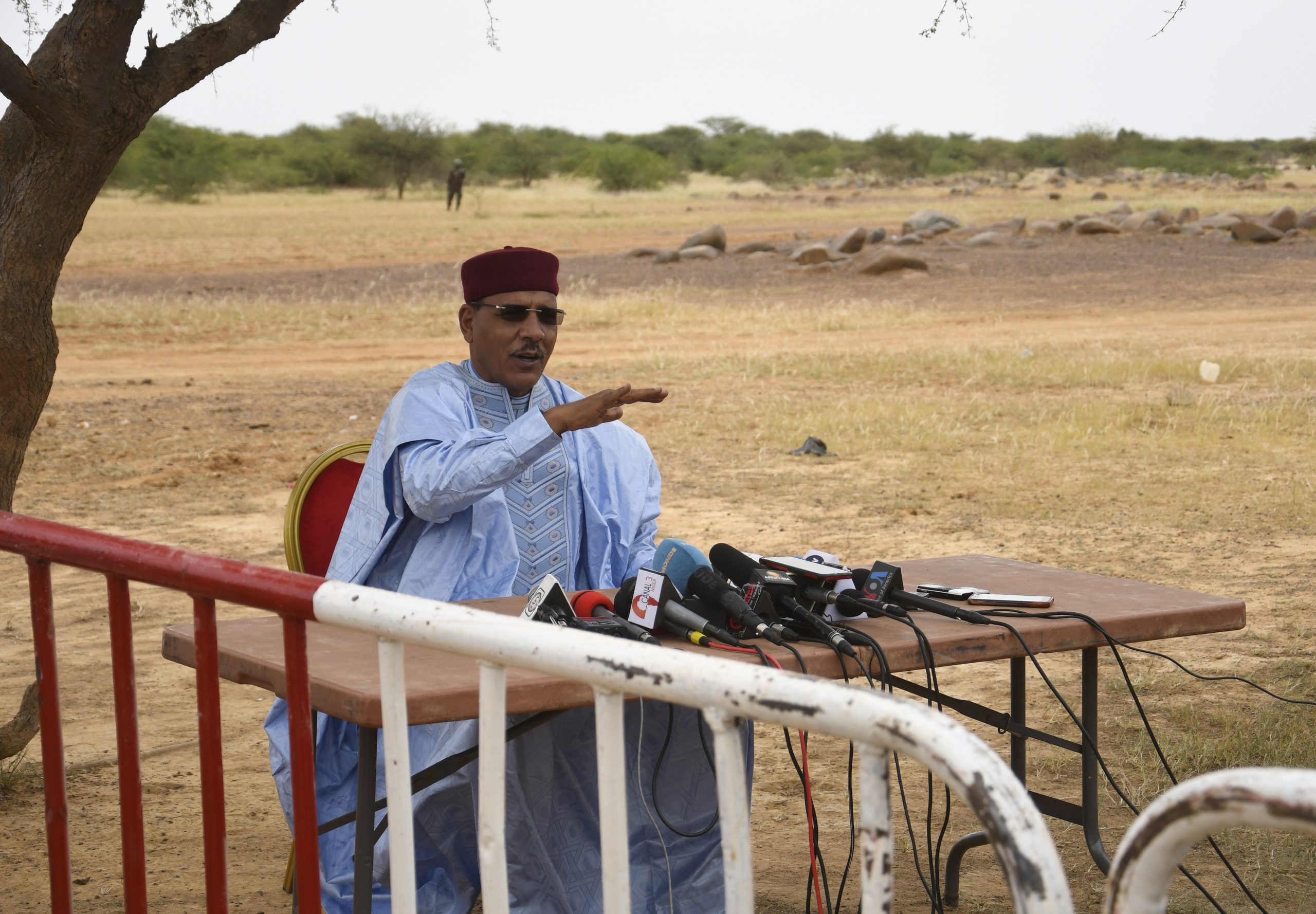
Supporters of Nigerien President Mohamed Bazoum gather to show their support for him in Niamey on July 26, 2023. (Photo: AFP)
Members of Niger’s presidential guard detained democratically elected President Mohamed Bazoum on July 26, declaring that they have seized control of the government and suspended the constitution of this country of 25 million people.
Protests against the unconstitutional seizure of power were violently suppressed.
The rationale for the attempted coup is not apparent. Reports suggest the move may have been triggered by the departing head of the presidential guard who was disgruntled for being sidelined. As with other coups in the region, grievances over security and poverty have been put forward to validate the extraconstitutional action.
“Protests against the unconstitutional seizure of power were violently suppressed.”
Niger’s Chief of Defense, General Abdou Sidikou Issa, declared the army’s support for the coup attempt on July 27, ostensibly in the interest of avoiding bloodshed.
Looters supporting the coup subsequently set fire to the ruling party headquarters. The streets in Niamey later saw widespread looting and other buildings and cars were set ablaze.
President Bazoum has refused to resign and has called on Nigeriens to resist and protect the country’s “hard-earned” democratic gains. This call has been echoed by Nigerien Foreign Minister Hassoumi Massaoudou and other senior officials.
ECOWAS, the African Union, the European Union, the United States, and other democratic governments have strongly condemned the attempted coup and called on the military to return to their barracks.
The leader of the Wagner Group, Yevgeny Prigozhin, currently in St. Petersburg for the Russia-Africa Summit, has welcomed the coup in Niger.
Russia’s involvement in the attempted coup is not clear, however, Niger has been in the crosshairs of complex Russian disinformation campaigns in recent years. Following the October 2022 coup in Burkina Faso, pro-Russian Telegram channels suggested Niger as a future target. Disinformation networks connected to the Wagner Group, furthermore, have twice sought to spark rumors of a coup in Niger, including through what appears to have been a carefully orchestrated online scheme coinciding with a trip abroad by President Bazoum in February 2023.
While the situation remains fluid and much remains unclear, this backgrounder provides relevant context and framing to the attempt to overturn the democratically elected government in Niger.
Overcoming a History of Military Government
President Mohamed Bazoum won presidential elections with 56 percent of the vote in February 2021. The elections were widely seen as free and fair. Bazoum succeeded President Mahamadou Issoufou who stepped down after completing his constitutionally limited second term in office.
This succession represented the first peaceful transfer of power in Niger’s history.
This democratic trajectory was emerging from Niger’s long history of military government, including four military coups between 1974 and 2010.
This fostered an extended period of stagnation for one of the world’s poorest countries. Over that 35-year timeframe, Nigeriens’ per capita income contracted by 29 percent. Niger endured negative growth rates in two-thirds of those years, part of Africa’s “lost decades” of development due to misgovernance.

An injured demonstrator is assisted as they flee shots fired to disperse the crowd that had gathered to protest the detention of President Mohamed Bazoum. (Photo: AFP)
Democratic Progress on Development and Security
Justifying the attempted coup in Niger on economic or security grounds is unsubstantiated by the widely differing trendlines we have seen in Niger under military versus civilian governments.
In the decade under Issoufou and Bazoum, per capita income in Niger has expanded by 26 percent, reversing the decades’ long slide. Economic growth in recent years has been robust with the World Bank projecting real gross domestic product growth for 2023 to be nearly 7 percent and 12.5 percent in 2024.
Despite global spikes in food prices from the pandemic and Russia’s invasion of Ukraine, Niger has managed to keep its inflation rate at around 4 percent, the lowest in the West Africa Economic and Monetary Union.
Niger is simultaneously grappling with an influx of 300,000 refugees fleeing conflicts in Mali and Nigeria, as well as 350,000 internally displaced people due to militant Islamist attacks spilling over its borders.
Nonetheless, Niger’s Human Development Index has been improving steadily during the past decade.
Under civilian rule, Niger was also steadily improving its ranking on Transparency International’s Corruption Perceptions Index.
Niger Under Civilian Government in 2023
- 7% projected economic growth
- 53% decline in fatalities linked to Sahelian militant Islamist groups
- 4% inflation rate, lowest in West Africa Economic and Monetary Union
Under its democratically elected civilian presidents, Niger has made progress strengthening public accountability, including within its defense and security forces. The government opened several high-level inquiries into the defense sector, exposing diversions and resulting in both civil and criminal investigations. The investigations revealed the need for greater scrutiny of procurement contracts to strengthen Niger’s 58,000-strong security sector, comprising an army, gendarmerie, national guard, police, and small air force. These savings have been vital for funding Niger’s $260 million annual defense budget, representing 7 percent of government spending.
Niger has been widely commended for its security response to the militant Islamist threat. Violent events in Niger account for less than 10 percent of the total in the Sahel. Yet, the Mali junta’s expulsion of French security forces and the restrictions on the MINUSMA peacekeeping force have resulted in a surge of violence on the Mali side of the border. This has subsequently caused an uptick in violent events in Niger in 2023. Still, fatality rates linked to militant Islamist group attacks in Niger are down by 53 percent compared to 2022.
A Crisis of Coups for Africa
Africa has experienced seven military coups since 2020—in Mali (twice), Burkina Faso (twice), Guinea, Chad, and Sudan. These coups build on other cases where dominant militaries have hijacked democratic movements to orchestrate successions that enable the militaries to retain ultimate authority—in Egypt, Zimbabwe, Algeria, and Burundi. There are also cases where elected leaders undermine democratic checks and balances in office to consolidate power and prolong their tenures, such as Tunisia’s auto-coup. When a military coup is tolerated in one country, it opens the door for power-seeking military actors elsewhere to do the same.
“When a military coup is tolerated in one country, it opens the door for power-seeking military actors elsewhere to do the same.”
Many of these recent military coups have been led by colonels commanding presidential guards or special forces units rather than military leaders at the top of the chain of command. These elite units are often provided specialized training, equipment, and salaries to enhance their capacity. Over time, some of these units have become politicized and accustomed to their privileged space near the center of power. This politicization erodes the avowed apolitical nature of the military, enabling their eventually seizing power for themselves.
Recent coup makers inevitably justify their actions on the basis of real or perceived grievances regarding security and development. Yet, Africa’s recent military juntas have not been reformist. Violent extremist events in Mali and Burkina Faso, for example, have tripled since the coups there have occurred. Neither have any of these juntas made any serious attempt to transition their countries back to democratic rule. Rather, these juntas have focused on seizing and holding power as an end in itself.
“These juntas have focused on seizing and holding power as an end in itself.”
In effect, West Africa (and Africa more generally) is facing the challenge of militaries reasserting their perceived entitlement to govern—a throwback to the 1960’s-1980’s.
The recent spate of coups in West Africa has also been characterized by the influence of global authoritarian actors, namely Russia. In Mali, Burkina Faso, and Niger, the coups were preceded by concerted Russian disinformation campaigns that attacked the elected civilian governments, the capability of democratic governments to maintain security, and tying these governments to anticolonial sentiment. Russia has subsequently been the leading external cheerleader (and beneficiary) for militaries seizing power in Africa.
Lacking domestic support, unaccountable military governments are also more vulnerable to sacrificing national sovereignty in support of their international patron.
The Vital Role of International Actors
Coups ultimately require the validation of regional and international actors to succeed. If international actors refuse to do so, then the putschists become politically isolated—a fact further compounded when they are denied access to a state’s sovereign financial accounts. International actors, in short, play a critical role in validating coups.
There is a practical financial dimension to this. Niger, for example, is the recipient of $1.8 billion in annual foreign assistance—almost all from democratic countries. The United States is the largest bilateral donor with $238 million in annual foreign aid.
“Coups ultimately require the validation of regional and international actors to succeed.”
The Organization of African Unity’s policy of non-interference has long been criticized as having incentivized coup plotters on the continent. Non-coincidentally, Africa experienced 82 coups between 1960-2000 contributing to the instability, corruption, human rights abuses, impunity, and poverty that characterized many African countries during that era.
The African Union’s shift to a policy of non-indifference at its creation in 2000 altered this calculation, contributing to a dramatic reduction in coups in the two decades of the new millennium. The perceived waning in commitment of regional and international actors to democratic practices, along with the distractions of the pandemic, have been accompanied by the recent surge in African coups.

Niger’s President Mohamed Bazoum addresses the media in Sara-Koira, western Niger in 2021. (Photo: AFP)
African regional bodies and international democratic actors, accordingly, play an indispensable role in upholding democratic norms. They must make clear that partnerships are built on strong commitments to democratic practices that are the foundation for greater diplomatic support, development and security assistance, and promotion of private investment. Regional and international actors, in turn, need to impose real costs on coup makers. Failure to do so, only invites additional coups. This includes not recognizing those who seize power extralegally, suspending financial assistance and debt relief, and freezing the assets of and denying coup leaders’ access to the international financial system.
Niger, Mali, Burkina Faso, and Guinea had only relatively recently embarked on a democratic path, after decades of military governments that had perpetuated poverty and instability. Given that these countries were beginning their democratic trajectory as fragile states, it was always expected that they would face a bumpy road—and navigate many grievances. Yet, such grievances are often cited as a reason to tolerate coups.
“Regional and international actors need to impose real costs on coup makers. Failure to do so, only invites additional coups.”
A missing lesson in these democratic experiences is how to deal constructively with the real grievances every society faces. Democracy does not guarantee good governance. It does, however, guarantee the means to put pressure on the government leading to self-correction—through elections, parliamentary inquiries, investigative journalism, anticorruption commissions, public protectors or ombudsman’s offices, protests, etc. Niger has made progress in just such areas during its democratic experience—processes that would be set back by another military junta.
In the introspection following another attempted coup on the continent, amplifying alternative paths for addressing grievances must become more of a priority.
Additional Resources
- Africa Center for Strategic Studies, “Mali Catastrophe Accelerating under Junta Rule,” Infographic, July 10, 2023.
- Joseph Siegle, “The Creeping Loss of African Sovereignty – Africa Center for Strategic Studies,” Spotlight, Africa Center for Strategic Studies, February 8, 2023.
- Africa Center for Strategic Studies, “Understanding Burkina Faso’s Latest Coup,” Spotlight, October 28, 2022.
- Daniel Eizenga, “’Transition’ Orchestrated by Chad’s Military Goes Awry,” Spotlight, Africa Center for Strategic Studies, November 15, 2022.
- Daniel Eizenga, “Chad’s Ongoing Instability, the Legacy of Idriss Déby,” Spotlight, Africa Center for Strategic Studies, May 3, 2021.
- Africa Center for Strategic Studies, “Autocracy and Instability in Africa,” Infographic, March 9, 2021.
- Joseph Siegle and Daniel Eizenga, “Walking Back the Coup in Guinea,” The Conversation, September 17, 2021.
- Joseph Siegle, “Africa’s Coups and the Role of External Actors,” ISPI, December 14, 2021.
- Africa Center for Strategic Studies, “The Legacy of Military Governance in Mali,” Spotlight, Africa Center for Strategic Studies, September 25, 2020.
- Joseph Siegle and Daniel Eizenga, “Mali Coup Offers Lessons in Democracy Building—but the Junta Must Go,” The Hill, September 19, 2020.
- Joseph Siegle and Candace Cook, “Circumvention of Term Limits Weakens Governance in Africa,” Infographic, Africa Center for Strategic Studies, September 14, 2020.
- Joseph Siegle and Daniel Eizenga, “Mali: Beware the ‘Popular’ Coup,” AllAfrica.com, August 31, 2020.
- Paul Nantulya, “Post-Nkurunziza Burundi: The Rise of the Generals,” Spotlight, Africa Center for Strategic Studies, June 22, 2020.
- Émile Ouédraogo, “Advancing Military Professionalism in Africa,” Research Paper No. 6, Africa Center for Strategic Studies, July 31, 2014.
- Mathurin C. Houngnikpo, “Africa’s Militaries: A Missing Link in Democratic Transitions,” Africa Security Brief No. 17, Africa Center for Strategic Studies, January 31, 2012.

